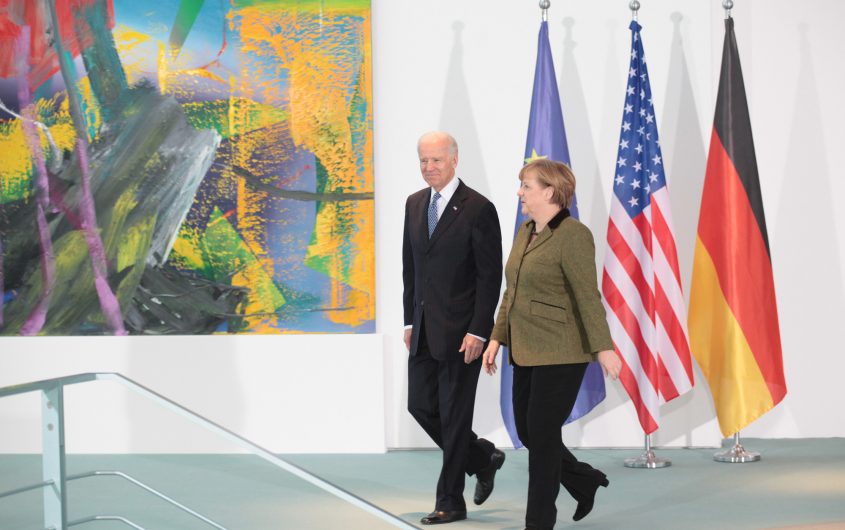
U.S. Embassy Berlin via Flickr
Would a Biden Win Make the U.S. More Like Germany?

Peter S. Rashish
Vice President; Director, Geoeconomics Program
Peter S. Rashish, who counts over 30 years of experience counseling corporations, think tanks, foundations, and international organizations on transatlantic trade and economic strategy, is Vice President and Director of the Geoeconomics Program at AICGS. He also writes The Wider Atlantic blog.
Mr. Rashish has served as Vice President for Europe and Eurasia at the U.S. Chamber of Commerce, where he spearheaded the Chamber’s advocacy ahead of the launch of the Transatlantic Trade and Investment Partnership. Previously, Mr. Rashish was a Senior Advisor for Europe at McLarty Associates, Executive Vice President of the European Institute, and a staff member and consultant at the International Energy Agency, the World Bank, UNCTAD, the Atlantic Council, the Bertelsmann Foundation, and the German Marshall Fund.
Mr. Rashish has testified before the House Financial Services Subcommittee on International Monetary Policy and Trade and the House Foreign Affairs Subcommittee on Europe and Eurasia and has advised three U.S. presidential campaigns. He has been a featured speaker at the Munich Security Conference, the Aspen Ideas Festival, and the Salzburg Global Seminar and is a member of the Board of Directors of the Jean Monnet Institute in Paris and a Senior Advisor to the European Policy Centre in Brussels. His commentaries have been published in The New York Times, the Financial Times, The Wall Street Journal, Foreign Policy, and The National Interest, and he has appeared on PBS, CNBC, CNN, NPR, and the BBC.
He earned a BA from Harvard College and an MPhil in international relations from Oxford University. He speaks French, German, Italian, and Spanish.
The polling averages from the political forecasters at fivethirtyeight.com have Joe Biden leading Donald Trump by 52.5 percent to 41.7 percent. In the three Midwestern swing states that were responsible for Trump’s surprise electoral college victory in 2016, Biden is up as well: Michigan + 8, Pennsylvania +6.5, Wisconsin +7.3. Even with a generous margin of error of 5 percent the former vice president has on average a couple of points to spare in these key battlegrounds.
That means it is well worth considering what a new Biden administration would mean for German-American relations. While it seems clear that U.S foreign and trade policies would differ considerably under a Trump Two or a Biden One, it is also important to look at the potential impact of domestic economic policies. Unusually, they may play as important a role as U.S. international engagement in setting the tone of bilateral ties. There are three reasons to think so.
First, what Biden wants to do in his Build Back Better recovery program released in July is to move the country closer to what in Germany is called the “social market economy.” That is an approach based on capitalist principles, but one where the state ensures basic fairness through an adequate social safety net, an effective role for both labor unions and small businesses, investments in the workforce and public infrastructure, and healthy competition among firms.
Second, other parts of Biden’s plan emphasize the need to invest in green jobs and technology-intensive industries, which would mirror much of what the European Union wants to do with its own recovery program, NextGen EU, put forward this summer with strong backing from Germany.
Finally, the former vice president has also come out in favor of a broader, “stakeholder” conception of capitalism that would be familiar to many successful family-owned German “Mittelstand” (mid-sized) companies, saying, “it’s way past time to put an end to the idea [that] the only responsibility a corporation has is to its shareholders. […] They have responsibility to their workers, their community, to their country.” Biden is not alone here: last year the Business Roundtable group of U.S. CEOs called for something similar.
If U.S. economic policies begin to resemble in various ways those found in Germany—as well as Austria and the Nordic countries—that would help create a sense of common values across the Atlantic.
But a change in U.S. domestic policies could also have a positive international impact. The more the Biden administration’s approach to the economy meshes with Europe’s, the easier it will be to coordinate post-pandemic recovery policies and the more effective they will be. That would be true on a bilateral level, but also within broader forums like the G7 or the G20.
Of course, that doesn’t mean there won’t be transatlantic conflicts: it remains to be seen, for example, how the Biden administration would treat the taxation of digital services or of carbon-intensive imports. But those issues should be easier to address the more Americans and Europeans have a common vision of the kind of economy they want to live in.









